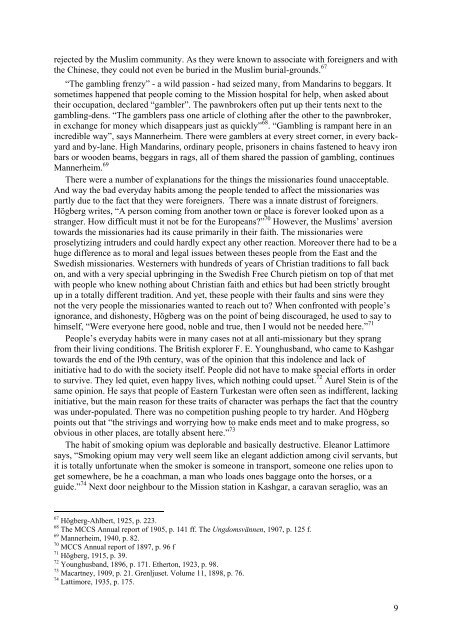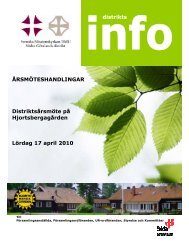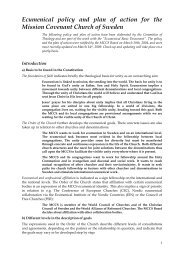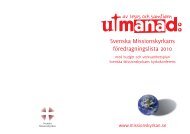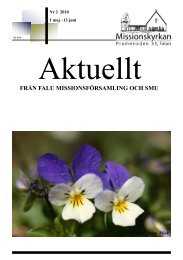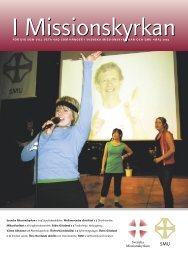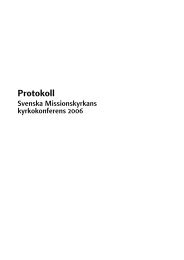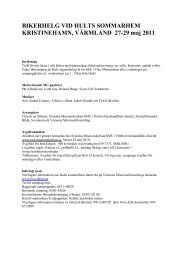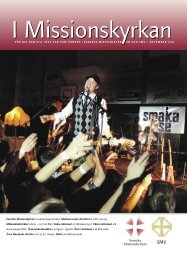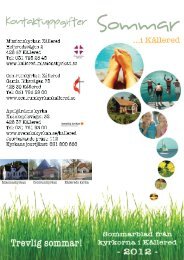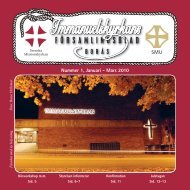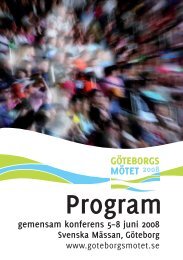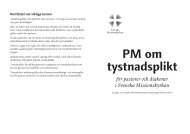Mission and Revolution in Central Asia - Svenska Missionskyrkan
Mission and Revolution in Central Asia - Svenska Missionskyrkan
Mission and Revolution in Central Asia - Svenska Missionskyrkan
Create successful ePaper yourself
Turn your PDF publications into a flip-book with our unique Google optimized e-Paper software.
ejected by the Muslim community. As they were known to associate with foreigners <strong>and</strong> with<br />
the Ch<strong>in</strong>ese, they could not even be buried <strong>in</strong> the Muslim burial-grounds. 67<br />
“The gambl<strong>in</strong>g frenzy” - a wild passion - had seized many, from M<strong>and</strong>ar<strong>in</strong>s to beggars. It<br />
sometimes happened that people com<strong>in</strong>g to the <strong>Mission</strong> hospital for help, when asked about<br />
their occupation, declared “gambler”. The pawnbrokers often put up their tents next to the<br />
gambl<strong>in</strong>g-dens. “The gamblers pass one article of cloth<strong>in</strong>g after the other to the pawnbroker,<br />
<strong>in</strong> exchange for money which disappears just as quickly” 68 . “Gambl<strong>in</strong>g is rampant here <strong>in</strong> an<br />
<strong>in</strong>credible way”, says Mannerheim. There were gamblers at every street corner, <strong>in</strong> every backyard<br />
<strong>and</strong> by-lane. High M<strong>and</strong>ar<strong>in</strong>s, ord<strong>in</strong>ary people, prisoners <strong>in</strong> cha<strong>in</strong>s fastened to heavy iron<br />
bars or wooden beams, beggars <strong>in</strong> rags, all of them shared the passion of gambl<strong>in</strong>g, cont<strong>in</strong>ues<br />
Mannerheim. 69<br />
There were a number of explanations for the th<strong>in</strong>gs the missionaries found unacceptable.<br />
And way the bad everyday habits among the people tended to affect the missionaries was<br />
partly due to the fact that they were foreigners. There was a <strong>in</strong>nate distrust of foreigners.<br />
Högberg writes, “A person com<strong>in</strong>g from another town or place is forever looked upon as a<br />
stranger. How difficult must it not be for the Europeans?” 70 However, the Muslims’ aversion<br />
towards the missionaries had its cause primarily <strong>in</strong> their faith. The missionaries were<br />
proselytiz<strong>in</strong>g <strong>in</strong>truders <strong>and</strong> could hardly expect any other reaction. Moreover there had to be a<br />
huge difference as to moral <strong>and</strong> legal issues between theses people from the East <strong>and</strong> the<br />
Swedish missionaries. Westerners with hundreds of years of Christian traditions to fall back<br />
on, <strong>and</strong> with a very special upbr<strong>in</strong>g<strong>in</strong>g <strong>in</strong> the Swedish Free Church pietism on top of that met<br />
with people who knew noth<strong>in</strong>g about Christian faith <strong>and</strong> ethics but had been strictly brought<br />
up <strong>in</strong> a totally different tradition. And yet, these people with their faults <strong>and</strong> s<strong>in</strong>s were they<br />
not the very people the missionaries wanted to reach out to? When confronted with people’s<br />
ignorance, <strong>and</strong> dishonesty, Högberg was on the po<strong>in</strong>t of be<strong>in</strong>g discouraged, he used to say to<br />
himself, “Were everyone here good, noble <strong>and</strong> true, then I would not be needed here.” 71<br />
People’s everyday habits were <strong>in</strong> many cases not at all anti-missionary but they sprang<br />
from their liv<strong>in</strong>g conditions. The British explorer F. E. Younghusb<strong>and</strong>, who came to Kashgar<br />
towards the end of the l9th century, was of the op<strong>in</strong>ion that this <strong>in</strong>dolence <strong>and</strong> lack of<br />
<strong>in</strong>itiative had to do with the society itself. People did not have to make special efforts <strong>in</strong> order<br />
to survive. They led quiet, even happy lives, which noth<strong>in</strong>g could upset. 72 Aurel Ste<strong>in</strong> is of the<br />
same op<strong>in</strong>ion. He says that people of Eastern Turkestan were often seen as <strong>in</strong>different, lack<strong>in</strong>g<br />
<strong>in</strong>itiative, but the ma<strong>in</strong> reason for these traits of character was perhaps the fact that the country<br />
was under-populated. There was no competition push<strong>in</strong>g people to try harder. And Högberg<br />
po<strong>in</strong>ts out that “the striv<strong>in</strong>gs <strong>and</strong> worry<strong>in</strong>g how to make ends meet <strong>and</strong> to make progress, so<br />
obvious <strong>in</strong> other places, are totally absent here.” 73<br />
The habit of smok<strong>in</strong>g opium was deplorable <strong>and</strong> basically destructive. Eleanor Lattimore<br />
says, “Smok<strong>in</strong>g opium may very well seem like an elegant addiction among civil servants, but<br />
it is totally unfortunate when the smoker is someone <strong>in</strong> transport, someone one relies upon to<br />
get somewhere, be he a coachman, a man who loads ones baggage onto the horses, or a<br />
guide.” 74 Next door neighbour to the <strong>Mission</strong> station <strong>in</strong> Kashgar, a caravan seraglio, was an<br />
67<br />
Högberg-Ahlbert, 1925, p. 223.<br />
68<br />
The MCCS Annual report of 1905, p. 141 ff. The Ungdomsvännen, 1907, p. 125 f.<br />
69<br />
Mannerheim, 1940, p. 82.<br />
70<br />
MCCS Annual report of 1897, p. 96 f<br />
71<br />
Högberg, 1915, p. 39.<br />
72<br />
Younghusb<strong>and</strong>, 1896, p. 171. Etherton, 1923, p. 98.<br />
73<br />
Macartney, 1909, p. 21. Grenljuset. Volume 11, 1898, p. 76.<br />
74<br />
Lattimore, 1935, p. 175.<br />
9


